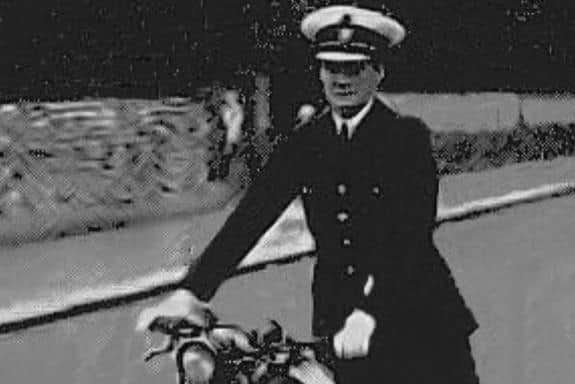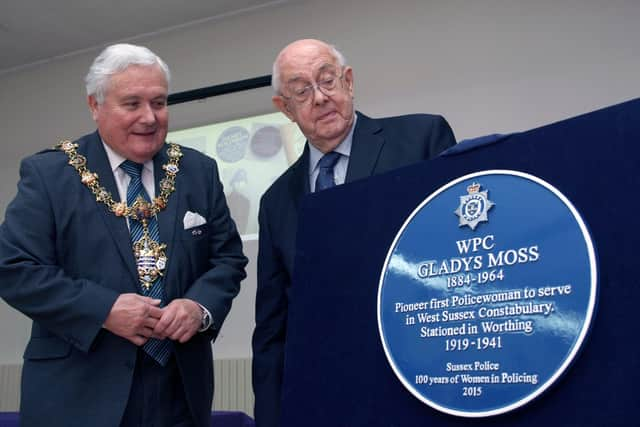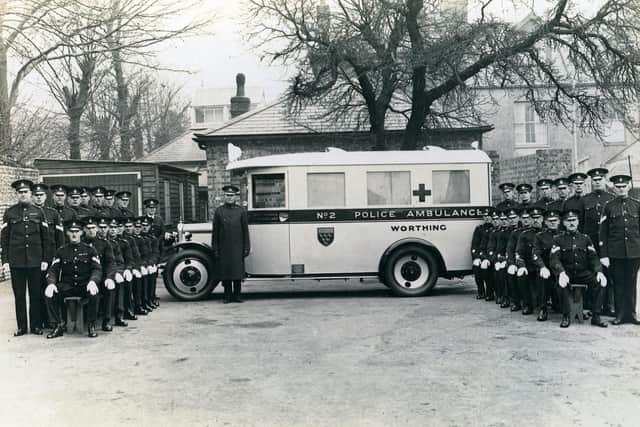Meet the first WPC in West Sussex, an exemplary police officer who helped solve Poison Pen case seen in film Wicked Little Letters starring Olivia Colman, Jessie Buckley and Timothy Spall
and live on Freeview channel 276
WPC Gladys Moss was stationed at Worthing from 1919 but she covered the whole county, focusing on cases that involved women and children.
She played a key role in investigating some of the most notorious crimes committed in West Sussex, including the still unsolved murder of an 11-year-old girl in 1924 and the Poison Pen case of 1923 in Littlehampton, the subject of an upcoming film starring Olivia Colman, Jessie Buckley and Timothy Spall.
Advertisement
Hide AdAdvertisement
Hide AdIn a career spanning more than 21 years, WPC Moss was posted to stations across Worthing, including time in Ann Street, High Street and, latterly, Heene Road.


Responding to an advert in the Worthing Gazette, 35-year-old Miss Moss applied to West Sussex Constabulary following a ten-month stint as a policewoman in a munitions factory in Hereford during the First World War.
She had been a member of the Women’s Police Service, an unofficial body founded by philanthropist Margaret Damer Dawson and women’s suffrage activist Nina Doyle.
Advertisement
Hide AdAdvertisement
Hide AdWhen she took up her duties in Worthing, it caused quite a stir, with the Gazette commenting that her uniform was 'similar to that of the women ticket collectors at the railway station'. WPC Moss also gained attention as the first motorcycle-riding policewoman in the country – a necessity, as she was responsible for cases involving women and children across the county.


The appointment of women was a ground-breaking change at the time of the First World War. The Chief Constable was first authorised to hire eight women to serve as special constables for clerical work. They were paid 38 shillings a week plus a uniform.
Miss Moss started with the Women’s Police Service and served with the Ministry of Munitions at one of HM Filling Factories at Hereford from 1917 until the end of the war. During this time, she featured in one police court case, after she found a half-burned cigarette in the explosives factory, which resulted in a fine of £2 for the young woman involved.
Miss Moss had previously worked as a governess and she returned to this work after the war until she spotted the advert in the Gazette, which enabled her to continue the police work she loved. She considered the Poison Pen case to be the important case she handled and her work on it proved extremely significant to its ultimate outcome.
Advertisement
Hide AdAdvertisement
Hide AdAs a trained first aider, Miss Moss would occasionally crew the Worthing Police Ambulance. At this time in West Sussex, some Divisions were equipped with ambulances paid for by wealthy benefactors.


A Blue Plaque in her honour was unveiled at Worthing Police Station, in Chatsworth Road, in November 2015 to mark 100 years of women in policing. The first policewoman in the country with full powers of arrest, Edith Smith, had been sworn in at Grantham in 1915.
At the unveiling, it was explained that WPC Moss’ service stood out as significiant among the stories of other early female officers. She rode various types of motorcycle over 14 years and was trained in ju-jitsu by Sergeant 'Billy' Beacher, who was stationed at Horsham.
She was also an expert shot with a small-bore rifle and was presented with a silver spoon memento to prove her prowess. She was commended for good work several times and retired in 1941, at the age of 57, with a certificate noting exemplary conduct. Miss Moss went to live in South Farm Road, Worthing, and died in 1964.